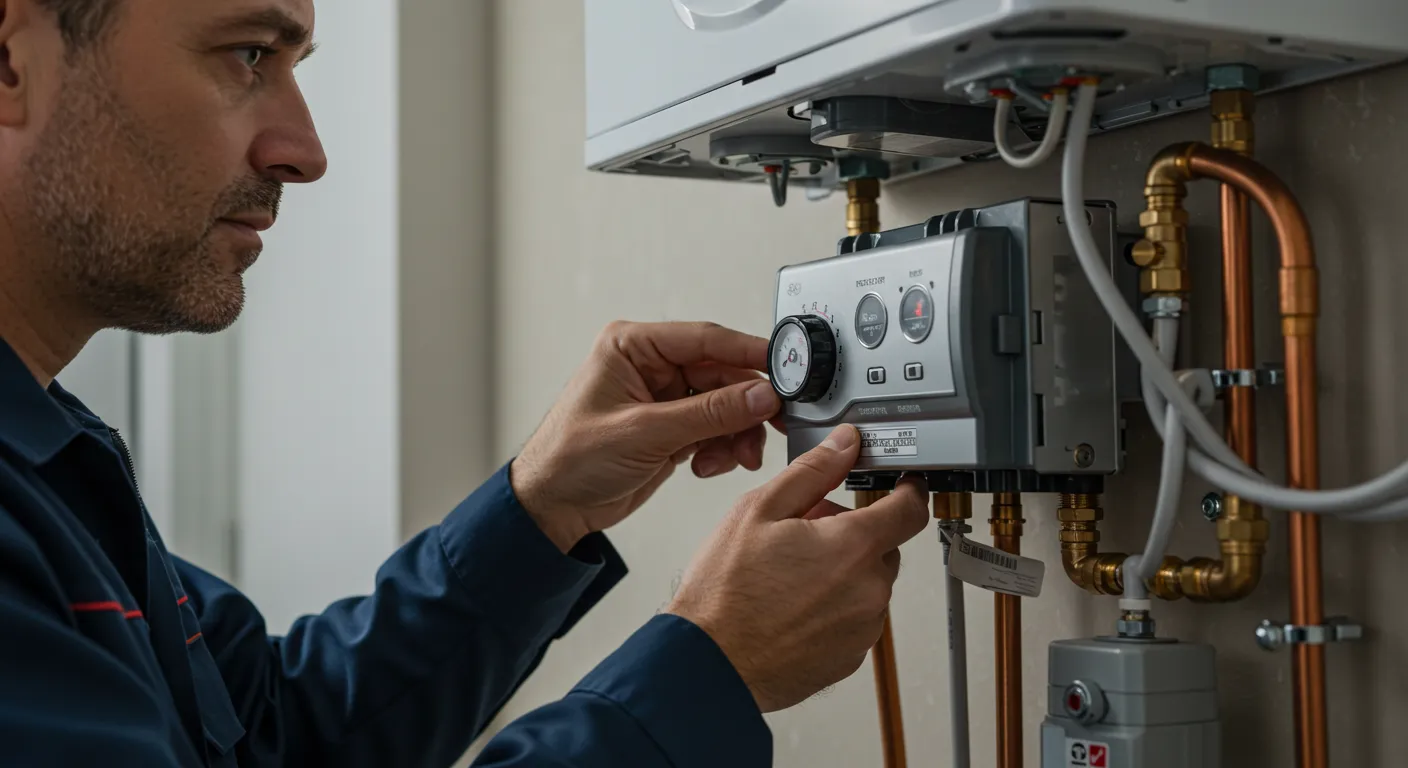Water Softener in Niwot, CO
Expert Water Softener Services for Your Home in Niwot, CO
Hard water is a common issue for many homeowners, leading to a myriad of frustrating problems from stubborn soap scum and dull laundry to inefficient appliances and dry skin. At Limelight Services, we understand these challenges intimately and provide comprehensive water softener solutions designed to transform your home's water quality. Our expert water softener services are tailored to address your specific needs, ensuring a noticeable improvement in your daily life and the longevity of your household investments.

Understanding Water Softeners and Their Benefits
A water softener system is a filtration device that removes hardness-causing minerals, primarily calcium and magnesium, from your home's water supply. These minerals are responsible for the adverse effects of hard water. By eliminating them, water softeners deliver significant improvements:
- Extended Appliance Lifespan: Hard water causes mineral buildup (scale) in appliances like water heaters, dishwashers, and washing machines, reducing their efficiency and lifespan. Softened water prevents this buildup, helping your appliances run better and last longer.
- Cleaner Dishes and Laundry: Say goodbye to unsightly spots on your dishes and stiff, faded laundry. Soft water allows soaps and detergents to lather more effectively, resulting in cleaner, brighter clothes and spotless dishes.
- Smoother Skin and Hair: Mineral deposits can leave a residue on your skin and hair, causing dryness, irritation, and dullness. Soft water rinses clean, leaving your skin feeling softer and your hair looking shinier and healthier.
- Reduced Soap and Detergent Usage: With soft water, you'll need significantly less soap, shampoo, and detergent to achieve the same cleaning power, leading to cost savings over time.
- Easier Cleaning: Soap scum and mineral stains become a thing of the past in your showers, sinks, and toilets, making routine cleaning much less strenuous.
- Improved Water Heater Efficiency: Scale buildup inside your water heater forces it to work harder and consume more energy to heat water. Softened water maintains efficiency, potentially lowering your energy bills.
Types of Water Softeners
Choosing the right water softener involves understanding the different technologies available, each offering unique advantages:
Ion-Exchange (Salt-Based) Water Softeners:
These are the most common and effective type. They work by exchanging hard minerals like calcium and magnesium with sodium ions. When the resin beads inside the softener become saturated with hard minerals, they undergo a regeneration cycle using a brine solution (saltwater) to flush out the minerals, which are then typically discharged down a drain.
- Pros: Highly effective at removing hardness, noticeable improvement in water quality.
- Cons: Requires salt replenishment, releases brine wastewater.
Salt-Free Water Conditioners (Template-Assisted Crystallization - TAC):
These systems do not technically "soften" water by removing minerals but rather "condition" it. They convert hardness minerals into a crystalline form that prevents them from sticking to surfaces and forming scale.
- Pros: No salt required, no wastewater, low maintenance.
- Cons: Does not remove minerals, so some "hard water" properties like soap lathering might not be fully improved compared to salt-based systems.
Dual-Tank Water Softeners:
Ideal for large households or commercial applications where a continuous supply of soft water is critical. When one tank regenerates, the other continues to provide soft water, ensuring no interruption.
Reverse Osmosis (RO) Systems:
While not solely a water softener, RO systems can remove a wide range of contaminants, including hardness minerals. They are typically used for drinking water at a specific tap rather than for the whole house.
Choosing the Right Water Softener for Your Home
Selecting the optimal water softener involves careful consideration of several factors unique to your household:
- Water Hardness Level: A professional water test is crucial to determine the exact hardness level of your water, measured in grains per gallon (GPG). This will help in sizing the appropriate system.
- Household Size and Water Usage: The number of occupants and your average daily water consumption directly impact the capacity needed for your water softener. A larger household requires a system with greater capacity to handle the demand between regeneration cycles.
- Space Availability: Different softener types and sizes require varying amounts of space for installation, particularly for the main unit and the brine tank for salt-based systems.
- Budget and Maintenance Preferences: Consider the initial investment, ongoing costs like salt for ion-exchange systems, and the level of maintenance you are comfortable with.
- Environmental Concerns: If water conservation and reduced salt discharge are priorities, a salt-free conditioner or a high-efficiency salt-based system might be more appealing.
Our experts at Limelight Services can conduct a thorough assessment of your water quality and usage patterns to recommend the most efficient and suitable water softener solution for your home.
Installation and Maintenance of Water Softeners
Professional Installation:
The installation of a water softener is a critical process that should be handled by experienced professionals. Proper installation ensures optimal performance, efficiency, and longevity of the system. Our technicians meticulously assess your plumbing, identify the ideal location for the unit, and connect it to your main water line, often bypassing exterior hose bibs so you can still use untreated water for outdoor tasks. We ensure all connections are secure and the system is properly programmed for your water hardness and usage.
Routine Maintenance:
While water softeners are designed for durability, regular maintenance is essential to keep them operating at peak efficiency.
- Salt-Based Systems: The primary maintenance involves regularly checking and refilling the salt in the brine tank. Using high-quality softener salt prevents issues like salt bridging, which can impede regeneration. We can advise on the best type of salt and a convenient refill schedule.
- Salt-Free Systems: These generally require less maintenance, primarily involving periodic filter replacements as recommended by the manufacturer.
- System Checks: Regardless of the type, periodic checks for leaks, proper valve operation, and overall system function are beneficial. Our service includes comprehensive inspections to identify and address any potential issues proactively. Regular maintenance not only prolongs the life of your unit but also ensures consistent soft water delivery.
Investment Considerations for Water Softening
The cost of a water softener system can vary significantly based on the type of softener, its capacity, the complexity of installation, and any additional features. While the initial investment might seem substantial, it's crucial to view it as a long-term benefit for your home and finances. Factors influencing the overall cost include:
- System Type and Size: High-capacity ion-exchange systems or specialized salt-free conditioners typically have higher upfront costs.
- Installation Complexity: Homes with unique plumbing configurations or locations requiring extensive modifications may incur higher installation fees.
- Ongoing Costs: For salt-based systems, the cost of salt is an ongoing expense, though generally modest. Filter replacements for salt-free systems are also a recurring, albeit less frequent, cost.
Over time, these costs are often offset by savings on energy bills (due to more efficient appliances), reduced consumption of cleaning products, and extended appliance lifespans, making a water softener a wise investment in your home's infrastructure.
Environmental Considerations and Sustainable Options
As awareness of environmental impact grows, so does the demand for more sustainable home solutions. In water softening, this translates to considering:
- Water Efficiency: Modern water softeners are designed to be more water-efficient during their regeneration cycles, using less water than older models. High-efficiency models are a strong consideration for eco-conscious households.
- Salt Usage: For salt-based systems, opting for a system that can be programmed to regenerate only when needed (demand-initiated regeneration) rather than on a fixed schedule can significantly reduce salt and water waste.
- Salt-Free Alternatives: For those highly concerned about salt discharge into local water systems, salt-free water conditioners offer an effective alternative, as they don't use salt and therefore don't discharge brine.
- Maintenance Practices: Proper maintenance ensures your system runs efficiently, minimizing waste and extending its life, thus reducing the need for premature replacement.
At Limelight Services, we are committed to helping you find solutions that not only meet your water quality needs but also align with your environmental values, offering a range of sustainable options and expert advice.
Frequently Asked Questions (FAQs) About Water Softeners
How do I know if I have hard water?
Common signs include soap scum in sinks and showers, spots on dishes, dry skin and hair, dull laundry, and reduced water pressure from mineral buildup in pipes. A professional water test can confirm the exact hardness level.
Is soft water safe to drink?
Yes, softened water is generally safe to drink. While salt-based softeners replace hard minerals with sodium, the amount of sodium added is usually minimal and falls well within dietary guidelines for most people. If you have specific health concerns or are on a sodium-restricted diet, consulting a physician or considering a separate drinking water filter (like an RO system) might be advisable.
How long does a water softener last?
With proper installation and regular maintenance, a quality water softener system can typically last 10 to 15 years, and sometimes even longer.
What's the difference between a water softener and a water filter?
A water softener specifically removes hardness minerals (calcium and magnesium) to prevent scale buildup and improve soap effectiveness. A water filter, on the other hand, removes impurities like chlorine, sediment, iron, or other contaminants to improve taste, odor, and overall water purity. Many homes benefit from having both types of systems.
Can I install a water softener myself?
While some DIY kits are available, professional installation is highly recommended. It ensures the system is correctly sized, plumbed, and programmed for optimal performance, preventing potential leaks or inefficiencies.
Experience the Difference with Limelight Services
Investing in a water softener is an investment in the comfort, efficiency, and longevity of your home. By choosing Limelight Services, you’re partnering with experienced professionals dedicated to providing high-quality water softener solutions, from precise installation to reliable maintenance. We pride ourselves on delivering exceptional service and ensuring you enjoy all the benefits of soft, clean water throughout your home.
Ready to eliminate the problems associated with hard water and experience truly soft water? Contact us today to schedule a comprehensive water analysis and discuss the best water softener solution for your home.

















